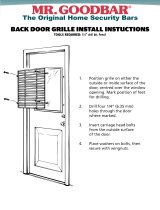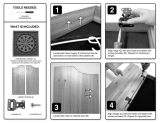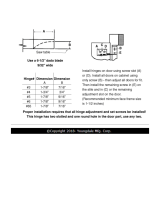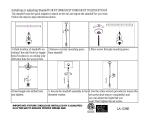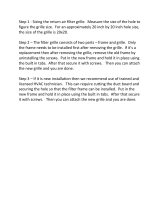
12
Installation
36" Refrigerators, Freezers
Tools
Required
• Tinsnips to cut banding
• Stepladder
• 1-1/2" open-end wrench
• Bucket
• Level
• Appliance Hand Truck
• Tubing cutter
• 7/16" open-end wrench
• #2 Phillips screwdriver
• Stubby Phillips
screwdriver
• Drill and appropriate bits
• 7/16" socket with 3"
extension for ratchet
• Safety glasses
Materials
Required
Hardware
Supplied
Flooring
• Special Velcro adhesive strips for 1/4" side panels
• 1/4-1/4 union with nuts
• Anti-Tip Mounting Brackets
• Water shut-off valve (optional but recommended)
• Water filter WR97X0214 (optional but recommended)
• Custom panel for door and grille panel.
• Side panels
For proper installation, the refrigerator or freezer must
be placed on a level surface of hard material the same
height as the rest of the flooring. This surface should be
strong enough to support a fully loaded refrigerator
and/or freezer.
NOTE: Protect the finish of the flooring. Cut a large
section of the cardboard carton and place under the
product where you are working.
Grounding
the
Refrigerator
When disconnecting the power cord from the adapter,
always hold the adapter in place with one hand and
pulling the power cord with the other hand. If this is not
done, the adapter ground terminal is very likely to break
with repeated use.
Should the adapter ground terminal break, DO NOT USE
the appliance until a proper ground has again been
established.
Use of Extension Cords
Because of potential safety hazards under certain
conditions, we strongly recommend against the use of
an extension cord. However, if you still elect to use an
extension cord, it is absolutely necessary that it be a UL
listed 3-wire grounding type appliance extension cord
having a grounding type plug and outlet and that the
electrical rating of the cord be 15 amperes (minimum)
and 120 volts.
IMPORTANT - (Please read carefully)
FOR PERSONAL SAFETY, THIS APPLIANCE MUST BE
PROPERLY GROUNDED.
The power cord of these appliances are equipped with
a three-prong (grounding) plug which mates with a
standard three-prong (grounding) wall receptacle to
minimize the possibility of electric shock hazard from
this appliance.
Have the wall outlet and circuit checked by a qualified
electrician to make sure the outlet is properly grounded.
Where a standard 2-prong wall outlet is encountered, it
is your personal responsibility and obligation to have it
replaced with a properly grounded 3-prong wall outlet.
IMPORTANT:
We recommend two separate 115V, 60Hz. 20 amp.,
properly grounded electrical outlets for a side by
side installation of two products. Each electrical
outlet should have a voltage rating that matches the
rating plate.
DO NOT, UNDER ANY
CIRCUMSTANCES, CUT
OR REMOVE THE THIRD
(GROUND) PRONG
FROM THE POWER CORD.
Use of Adapter plug
Because of potential hazards under certain conditions,
we strongly recommend against use of an adapter plug.
However, if you still elect to use an adapter, where local
codes permit, a TEMPORARY CONNECTION, may be
made to a properly grounded 2-prong wall outlet by use
of a UL listed adapter available at most hardware
stores.
The larger slot in the adapter must be aligned with the
larger slot in the wall outlet to provide proper polarity in
the connection of the power cord.
• Hardware for side panel installation.
• 35" long 2x4 for Anti-Tip support
FICHE D’ADAPTATION
(Fiches d’adaptation non permises au Canada)
Attaching the adapter ground terminal to a wall
outlet cover screw does not ground the appliance
unless the cover screw is metal, and not insulated,
and the wall outlet is grounded through the house
wiring. You should have the circuit checked by a
qualified electrician to make sure the outlet is
properly grounded.
CAUTION
PRUDENCE




















